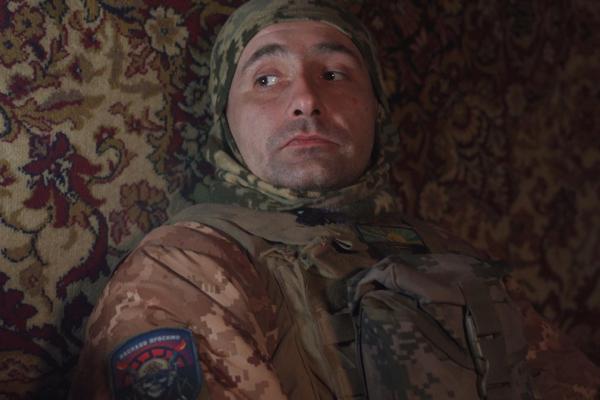The lack of manpower in the army is felt by the infantry the most, as they have to stay in position longer due to the lack of replacement people. Slidstvo.Info journalists had the opportunity to meet the infantrymen of the 93rd Separate Mechanized Brigade “Kholodnyi Yar” who had withdrawn from their positions near Bakhmut. The men lived in “burrows” for nine days under constant shelling, saving food and water, according to a new report by Slidstvo.Info.
“LIVING ONE DAY AT A TIME”
The basement, where journalists are waiting for the infantrymen, is warm and almost cozy. The stove and checkered tapestries on the walls do their job. This basement is a few kilometers from the front line near Bakhmut. Here, the infantrymen who are to replace their brothers-in-arms at point zero are waiting for permission to leave. The soldiers who spent nine days in the front line in “burrows” will also return here.
It’s 01:30 in the morning. It is possible to rotate soldiers at the position only at night and in small groups due to constant shelling and enemy drones.
“It’s living one day at a time. Because you go and you don’t know what will happen. And there is nowhere to hide. And it’s not like there’s a ‘thump’ – one shell or one mortar bomb fall. They are falling there continuously. They (the Russians – ed.) have zeroed in and are waiting for us to set out,” says infantryman Volodymyr with the call sign “Saul”.
In half an hour, he has to leave this warm basement. The man will accompany the group to their positions, as they will be walking in complete darkness. They need a person who knows his way around.
He and his brother-in-arms will go only with backpacks. They pack only the bare necessities: food, water, and an ammunition allowance. A minimum of everything, because the way to the positions is about 2 kilometers.
“When we run out of food and water, we get ‘gifts’ dropped from a drone, but they contain 200 grams of water in bottles, but they often break when they fall. So you wait for that water, and it only lasts for a couple of sips,” says “Saul”.
“DAD, ARE YOU STILL ALIVE THERE?”
According to the fighter, he has been acting as a guide for not very long. Four days ago, the soldier who had been performing this role lost his leg, so “Saul” had to replace him.
“Saul” is from Sumy Oblast and has been in the Armed Forces with short breaks since 2014. He has three children, so he could have avoided going to war now, but he made this decision because of his children, he stresses.

“Saul”
“I want it to be quiet where they live. That is why I am here. This is the most important thing. Even my youngest understands everything. He writes to me: ‘Dad, are you still alive there?’. He tells me where he is going, and what he is doing. It gives me energy,” says “Saul”.
“BE SPARING WITH YOUR FOOD AND WATER, GUYS.”
Just before they go to their positions, the guys, already wearing bulletproof vests and helmets, are gathered together to be shown the way on the map and given instructions.
“If there is shelling, you guys lie down and then, when it stops, continue moving. Be careful! Keep your distance – that’s the most important thing,” a soldier with the call sign “Kazbek” says in a low and confident voice.

“Kazbek”
The man gives the soldiers radios, power banks, and nightlights. Strictly, a little fatherly, reminding them that they have to pass them on to their fellows who will be replaced at their positions.
“Be sparing with food and water, guys. We will drop ‘gifts’ from a drone, but it is difficult. For example, we pack six bottles of water, but when we drop them from a 100-meter height, only one or two remain,” notes “Kazbek”.

In this way, batteries for radios, food, and cigarettes are also delivered to the soldiers, as it is too risky for people to travel this route.
“And how long are we going in for? Five days? But you know how it goes, if it’s five days, it’ll end up being ten…” remarked the infantry soldier with the call sign “Sima”, seeming not to expect an actual answer.
“Kazbek” declares that the soldiers are not left at point zero for that long, although the current group is to be replaced after nine days at the positions.
In the end, the rotation of soldiers at the positions lasts until the morning. We can see how the black and white picture from the drone that monitors the area where the soldiers are entering gradually brighten, and the craters that cover the ground nearby become even more visible.
Finally, they report on the radio that the soldiers who were replaced at their positions have reached the point and are waiting for the car.
“I WAS THROWN BY THE BLAST WAVE”
A little later, tired and black from soil, infantrymen with call signs “Dyed” and “Khariok” descend to the basement.
“Dyed” refuses to talk and nervously lights a cigarette. Instead, “Khariok” with an emotionless face tells all about their stay “at point zero”.
“There, the Russians are constantly trying to enter our positions in small groups. As I understand it, they are not taking their own men, because the KIAs have been lying there for about a month near our dugout,” the soldier says.
The serviceman explains that their positions are located almost right next to the Russian ones, because sometimes they can even hear their voices.
Khariok’s face is smeared with earth and burned on the left side, which is a mark from an enemy drone.
 “Khariok”
“Khariok”
“Drones are the number one scourge generally. I was thrown back by a blast wave. And then there was another explosion – they were dropping nerve gas. It’s good that we had gas masks with us,” says “Khariok”.
The man is surprisingly calm about his experiences over the past nine days, although he joined the army only a few months ago. He hails from Kharkiv, from the area that suffered the most from the Russian shelling, North Saltivka. His home was destroyed, so for the last two years, he has been living in a dormitory. It was there that he received the draft summons.
“I didn’t try to ‘dodge’. War is war, I decided so for myself, so I stopped running around, I went to the military enlistment office, underwent training, and ended up here in the infantry,” explains “Khariok”.
When asked how much time they will have to rest now, the man shrugs his shoulders. The previous group of infantry came under fire, so there are not enough people, and therefore, those who have returned cannot be guaranteed too much rest.



